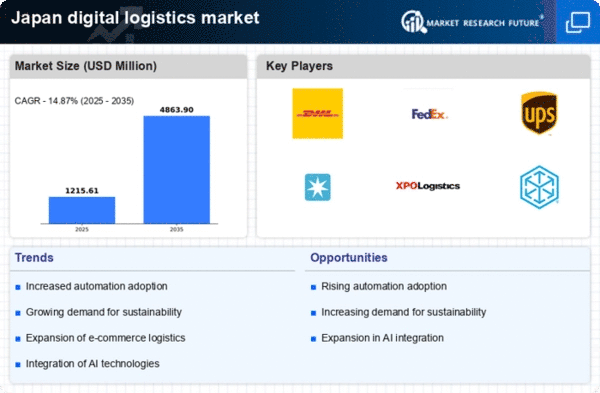Integration of Advanced Analytics
The integration of advanced analytics into logistics operations is emerging as a key driver for the digital logistics market in Japan. Companies are harnessing big data to gain insights into consumer behavior, optimize inventory management, and enhance route planning. This data-driven approach allows logistics providers to make informed decisions, potentially reducing delivery times by up to 15%. Furthermore, predictive analytics can forecast demand trends, enabling better resource allocation. As businesses increasingly recognize the value of data in logistics, the digital logistics market is poised for substantial growth, reflecting a shift towards more intelligent and responsive logistics solutions.
Government Initiatives and Support
The Japanese government plays a crucial role in fostering the digital logistics market through various initiatives and support programs. Policies aimed at enhancing infrastructure, such as the development of smart logistics hubs, are being implemented to facilitate seamless transportation and distribution. Additionally, the government is investing in research and development to promote innovative logistics solutions. For example, funding for projects that integrate AI and big data into logistics operations is becoming more prevalent. Such initiatives not only improve efficiency but also encourage private sector investment, thereby propelling the growth of the digital logistics market.
Technological Advancements in Logistics
The digital logistics market in Japan is experiencing a surge due to rapid technological advancements. Innovations such as artificial intelligence (AI), machine learning, and the Internet of Things (IoT) are transforming logistics operations. These technologies enhance efficiency, reduce costs, and improve service delivery. For instance, AI-driven analytics can optimize supply chain management, leading to a potential reduction in operational costs by up to 20%. Furthermore, IoT devices facilitate real-time tracking of shipments, which is increasingly demanded by consumers. As a result, logistics companies are investing heavily in these technologies, indicating a robust growth trajectory for the digital logistics market.
E-commerce Growth and Consumer Expectations
The digital logistics market in Japan is significantly influenced by the growth of e-commerce. With online retail sales projected to reach ¥20 trillion by 2025, logistics providers are under pressure to meet rising consumer expectations for fast and reliable delivery. This shift necessitates the adoption of advanced logistics solutions, including last-mile delivery innovations and automated warehousing systems. Companies are increasingly leveraging digital platforms to streamline operations and enhance customer satisfaction. The demand for same-day delivery services is also on the rise, compelling logistics firms to adapt swiftly to these changing dynamics, thereby driving growth in the digital logistics market.
Rising Demand for Supply Chain Transparency
In Japan, there is a growing demand for transparency within supply chains, which is significantly impacting the digital logistics market. Consumers and businesses alike are increasingly concerned about the origins of products and the environmental impact of logistics operations. This trend is prompting logistics providers to adopt digital solutions that enhance visibility and traceability throughout the supply chain. Technologies such as blockchain are being explored to ensure data integrity and transparency. As companies strive to meet these expectations, the digital logistics market is likely to expand, driven by the need for accountability and sustainability in logistics practices.
















